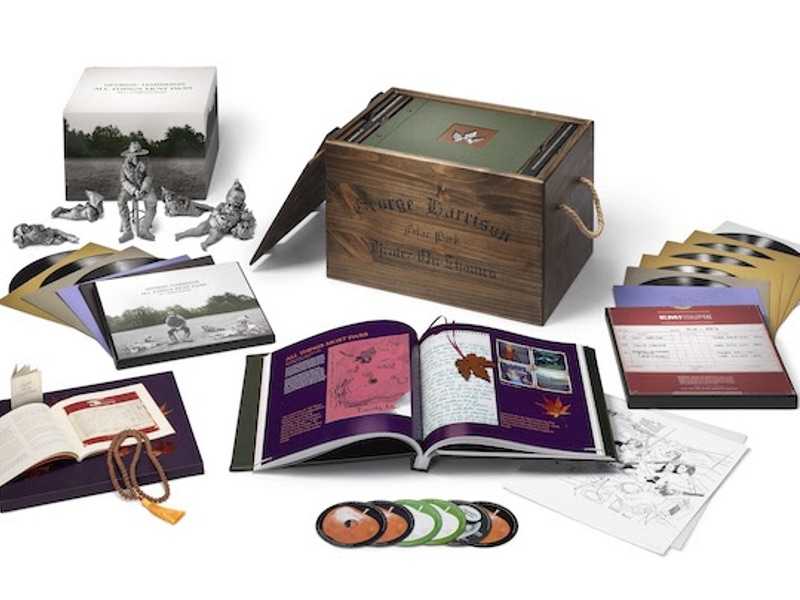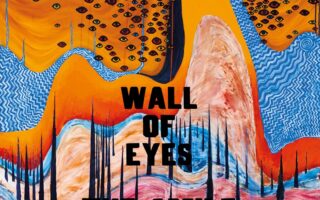
Coming hot on the heels of its 30th and 40th anniversary editions, The Quiet One’s masterpiece now comes with even more bells and whistles including, in the uber deluxe version, a wooden bookmark made from a felled Oak tree from Harrison’s estate. All for the reasonable price of £859.99.
While that is probably too rich for my, your or even Paul McCartney’s blood, it has to be said that few other albums are worthy of such comprehensive attention.
With the (understandable) domination of John Lennon and Paul McCartney compositions throughout The Beatles’ career, George Harrison was left to stockpile his own work – barring a track or two for each record – throughout the 1960s until the Fab Four officially split in April 1970.
Wasting no time and armed with a plethora of songs, George Harrison entered three studios in London in May determined to make up for lost time.
As it turned out, through no fault of his own the sessions overran significantly (reasons included regular visits to Liverpool to see his dying mother and the general…eccentricity of producer Phil Spector) but his ‘proper’ debut solo album was worth the wait. As all right-thinking music fans know, All Things Must Pass is the best solo Beatle album.
The laconic, woozy opener I’d Have You Any Time (a co-write with pal Bob Dylan) was a deception, gradually easing the listeners into the album before an onslaught of musicianship: My Sweet Lord, arguably (but unjustly) Harrison’s signature solo song, is a rare example of a track that has lost none of its impact through over-exposure, while Wah-Wah (written during the legendarily tempestuous Let It Be sessions) bounces gloriously, Ringo forming a stoic backbone on skins, as per usual.
Isn’t It A Pity (Version One) is almost the yin to Hey Jude’s yang, and is still going on somewhere, while the majestic What Is Life goes straight for the Big Themes and attaches them to an equally Big Chorus. Perhaps more than other Beatles compositions, it arguably informed the Gallagher modus operandi, and it can be presumed that Frank Black was a fan of the guitar riff.
With so many songs in his arsenal, it’s odd that Harrison selected a cover for the album (Dylan’s If Not For You) but as with so many Zimmerman covers, it surpasses the original, his soon-to-be trademark slide guitar giving the song an aspirational vibe.
As the album keeps coming (a triple album on release), the quality level rarely dips. The sublime melody of Beware Of Darkness lives long in the memory, as does the elegant grandeur of the title-track. The wonky-tonk (not a typo) of I Dig Love showed a more playful side to Harrison’s songwriting, and Art Of Dying is the song the launched a thousand 1970s cop shows.
While the third section of this truly epic album may be more for the musos, consisting primarily of studio jams, it’s fascinating for the true fans to peak behind the curtains of the creation of this masterpiece. Out Of The Blue in particular, a languid slice of psychedelia which treats blues as prog, was basically responsible for most variants of rock music in the seventies and beyond.
The package has been given the full remastering treatment and so, unsurprisingly, the music sounds exquisite. Spector’s Wall Of Sound (which largely dominates despite his departing the project mid-way through) isn’t to everyone’s taste, but to hear it with even greater clarity is a thrill, and Harrison took over the production reins for the latter sessions and somehow managed to out-Spector the man himself.
The demos and early versions of the tracks contain much for the ardent fan to obsess over, with Harrison’s lyrical tweaks to Isn’t It A Pity (‘isn’t it so shitty, isn’t it a pain how we do so many takes?’) one of many highlights.
In contrast, the yodelling larks of Down To The River are inessential, to be kind. And somehow, despite everything under the Beatle banner having received multiple re-evaluations and re-releases, we are even treated to some unheard songs, although it’s not hard to see why they have remained unreleased for half-a-century.
Going Down To Golders Green is a Sun Records-era Elvis pastiche, while Dehru Dun is plodding folk with mystical lyrics, the sort of thing the youngest Beatle was often parodied for. Likewise Om Hare Om (Gopla Krishna), although it does at least up the pace as it proceeds.
Being so ingrained in our psyche, it’s now far too easy to take The Beatles for granted. Yet all it takes is a brief foray back into their world to reaffirm how lucky we were to have them.
With an all-star cast (Clapton, Voorman, Starr et al), this 50th Anniversary Edition may raise cynical eyebrows at its necessity, but for fans of The Beatles or rock music as a whole, it’s a lip-smacking release.
Oh, and George Harrison was 26 when he made it.



